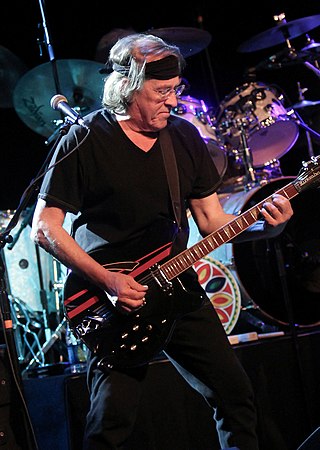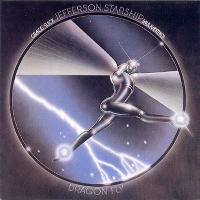
Jefferson Airplane was an American rock band formed in San Francisco, California in 1965 that became one of the pioneering bands of psychedelic rock. The group defined the San Francisco Sound and was the first from the Bay Area to achieve international commercial success. They headlined the Monterey Pop Festival (1967), Woodstock (1969), Altamont Free Concert (1969), and the first Isle of Wight Festival (1968) in England. Their 1967 breakout album Surrealistic Pillow was one of the most significant recordings of the Summer of Love. Two songs from that album, "Somebody to Love" and "White Rabbit", are among Rolling Stone's "500 Greatest Songs of All Time".

Jefferson Starship is an American rock band from San Francisco, California, formed in 1974 by a group of musicians including former members of Jefferson Airplane. Between 1974 and 1984, they released eight gold or platinum-selling studio albums, and one gold-selling compilation. The album Red Octopus went double-platinum, reaching No. 1 on the Billboard 200 chart in 1975. The band went through several major changes in personnel and genres through the years while retaining the Jefferson Starship name. The band name was retired in 1984, but it was picked up again in 1992 by a revival of the group led by Paul Kantner, which has continued since his death in 2016.
KBC Band was formed in 1985 by former Jefferson Airplane members Paul Kantner, Marty Balin and Jack Casady (bass). Other members included Keith Crossan, Tim Gorman, Slick Aguilar and Darrell Verdusco (drums). Their sole LP, KBC Band, featured the singles "America" and "It's Not You, It's Not Me."

Paul Lorin Kantner was an American rock musician. He is best known as the co-founder, rhythm guitarist, and a secondary vocalist of Jefferson Airplane, a leading psychedelic rock band of the counterculture era. He continued these roles as a member of Jefferson Starship, Jefferson Airplane's successor band.

Craig Clinton Chaquico is an American guitarist, songwriter, and composer. From 1974 to 1990 he was lead guitarist for the rock bands Jefferson Starship and Starship. In 1993, he started a solo career as an acoustic jazz guitarist and composer.

Bark is the sixth studio album by American rock band Jefferson Airplane. Released in 1971 as Grunt FTR-1001, the album is one of the Airplane's late-period works, notable for the group's first personnel changes since 1966. The album was the first without band founder Marty Balin and the first with violinist Papa John Creach. Drummer Spencer Dryden had been replaced by Joey Covington in early 1970 after a lengthy transitional period in which both musicians had performed with the band.

Long John Silver is the seventh studio album by the American rock band Jefferson Airplane, and their last album of all new material until 1989. It was recorded and released in 1972 as Grunt FTR-1007.

Jefferson Airplane is the eighth and final studio album by San Francisco rock band Jefferson Airplane, released on Epic Records in 1989. Marty Balin, Paul Kantner, Grace Slick, Jorma Kaukonen and Jack Casady all returned for the album and supporting tour, though Spencer Dryden did not participate. The album and accompanying tour would mark the last time Jefferson Airplane would perform together until their 1996 induction to the Rock and Roll Hall of Fame.

Dragon Fly is the debut album by Jefferson Starship, released on Grunt Records in 1974. It peaked at No. 11 on the Billboard 200, and has been certified a gold album. Credited to Grace Slick, Paul Kantner, and Jefferson Starship, the band itself was a turning point after a series of four albums centering on the partnership of Kantner and Slick during the disintegration of Jefferson Airplane through the early 1970s.

Flight Log (1966–1976) is a compilation album by the American rock band Jefferson Airplane. Released in January 1977 as a double-LP as Grunt CYL2-1255, it is a compilation of Jefferson Airplane and Airplane-related tracks, including tracks by Jefferson Starship and Hot Tuna, as well as solo tracks by Paul Kantner, Grace Slick, and Jorma Kaukonen. Although primarily a compilation album, the album includes one previously unreleased song: "Please Come Back" written by Ron Nagle and performed by Jefferson Starship. "Please Come Back" is not available on any other release.

Last Flight is an authorized recording released in the United Kingdom, taken from the last live performance of the San Francisco rock group Jefferson Airplane prior to the band's dissolution in 1972. The concert was held at the Winterland Arena in San Francisco, and selected tracks were released on the 1973 album Thirty Seconds Over Winterland. Last Flight consists of the entire concert with the exception of the encore, Marty Balin's "You Wear Your Dresses Too Short", previously released on the Jefferson Airplane Loves You box-set. Balin sings lead vocals on "Volunteers" much to the surprise of the audience since he left the band in late 1970.

Jefferson Airplane Loves You is a three-CD boxed set of recordings by the San Francisco rock band Jefferson Airplane with extensive liner notes by Jeff Tamarkin, author of the Jefferson Airplane history Got a Revolution: The Turbulent Flight of Jefferson Airplane.

At the Family Dog Ballroom is a recording of a 1969 performance by the San Francisco rock band Jefferson Airplane at the Family Dog Ballroom in San Francisco. Released on CD in the United Kingdom, the album is a digipak offering of material only recently rediscovered. A poster is included.

Sunfighter is a 1971 album created by Paul Kantner and Grace Slick from Jefferson Airplane. The album was released shortly after the Airplane album Bark was released, and is the second record released on the Airplane's own Grunt vanity label, distributed by RCA Records. The album features a picture of their baby daughter, China Wing Kantner, on the cover. Many Bay Area musicians perform on the album, including all of the then current lineup of Jefferson Airplane, members of the Grateful Dead, Crosby, Stills, and Nash, and the horn group, Tower of Power. This album is also the first time a 17-year old Craig Chaquico recorded with Paul Kantner and Grace Slick. He would go on to become the lead guitarist for Jefferson Starship.

Baron von Tollbooth & the Chrome Nun is a collaborative studio album by Jefferson Airplane members Paul Kantner, Grace Slick, and David Freiberg, released in May 1973.

Grunt Records was a vanity label founded in 1971 by Jefferson Airplane and distributed by RCA Records. Initially created to sign local Bay Area acts, the label later was used only for Jefferson Starship and Hot Tuna releases. The label ended use in 1987 after Grace Slick left Starship.

Planet Earth Rock and Roll Orchestra is the final solo album by Paul Kantner and the only Kantner solo release to be solely credited to the singer-songwriter. The title comes from an unofficial name for San Francisco artists who recorded on various albums in 1970–1973, also known as PERRO. "The Mountain Song" is dedicated "to David C, Jerry G, Graham N, Grace S, David F, Billy K and Mickey H and to one summer when all of our schedules almost didn't conflict," and was written during the 1970s recording sessions by Kantner and Jerry Garcia. On the album, Kantner utilizes many of his collaborators and family members to front an extended musical trip similar to his then-recent Jefferson Starship efforts.
The Planet Earth Rock and Roll Orchestra (PERRO) is a nickname given to some artists who recorded together in the early 1970s. They were predominantly members of Jefferson Airplane, the Grateful Dead, Quicksilver Messenger Service, and Crosby, Stills, Nash & Young. Their first album together was for Paul Kantner/Jefferson Starship's Blows Against the Empire.

David Freiberg is an American musician best known for contributing vocals, keyboards, electric bass, rhythm guitar, viola and percussion as a member of Quicksilver Messenger Service, Jefferson Airplane, and Jefferson Starship. Among other tracks, he co-wrote "Jane", a hit for Jefferson Starship.
















